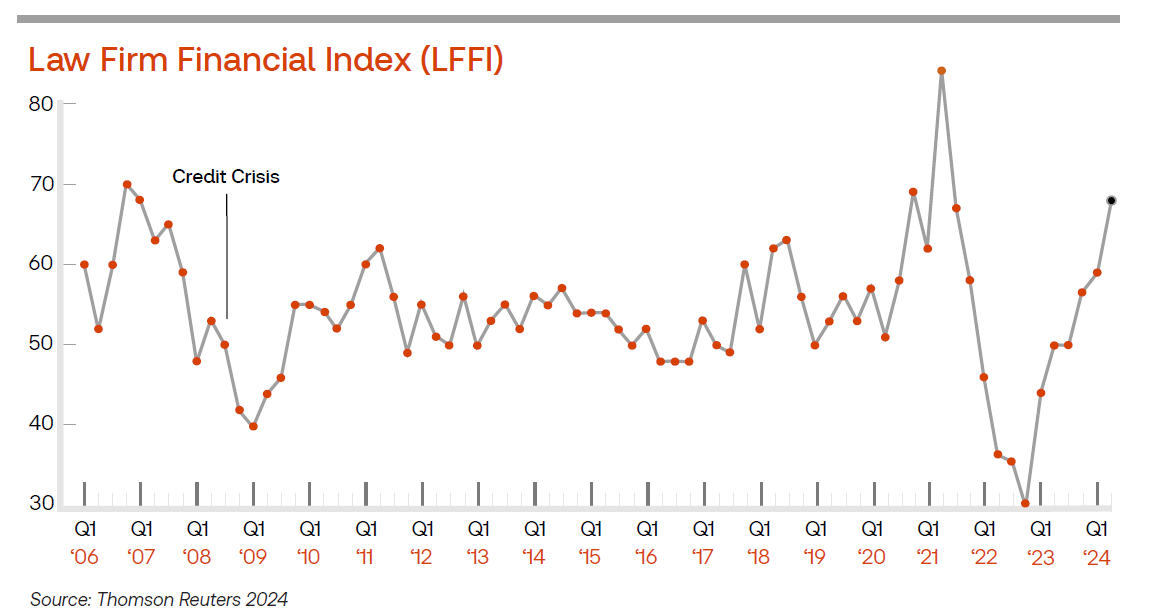New data shows that law firms’ financials bounced back to record heights in Q2 2024 with diversified demand and arguably the most sustainable growth in recent history
There’s been a significant resurgence in the financial health of law firms, driven by robust transactional practices and solid fundamentals, according to Thomson Reuters® Institute Law Firm Financial Index (LFFI) for the second quarter of 2024.
Indeed, the Q2 2024 LFFI rose 8 points to a score of 67, one of its highest scores of all time.
Key Takeaways in Q2
-
-
- The LFFI score reached its third-highest level since the Global Financial Crisis.
- Transactional demand rebounded, providing increased balance for the legal industry.
- Law firms are now in a more sustainable position compared to previous peaks.
-
The Index score marks six consecutive quarters of progress for law firms, and this improvement is evident across all areas measured by the LFFI. Perhaps most notably, productivity became positive for the first time since the transactional boom of 2021 and early-2022, highlighting a significant recovery and pointing to a potential brighter future.

From a legal demand perspective, most major practice areas experienced growth. Counter-cyclical practices such as litigation, bankruptcy, and labor & employment led the way in terms of the pace of growth. And importantly, transactional demand also returned to growth mode after nearly three years of poor performance, contributing significantly to overall firm performance.
The record-breaking growth in worked rates that were achieved in Q1 2024 continued in Q2. This outcome led fees worked to see the second-fastest acceleration since we’ve tracked this data, only behind the fees worked pace in Q2 2021. If we consider past baselines, however, Q2 2024 would’ve seen the all-time fastest organic growth in this metric. In fact, fees worked performance in Q2 was achieved due to both the strength of counter-cyclical practices and the revival of transactional ones.
It is also worth mentioning is that the transactional practice areas saw a considerable increase in fees in Q2 thanks to higher billing rates, as the dual growth in both transactional and counter-cyclical practices has provided a more sustainable revenue stream for law firms.
Securing a more stable position
Compared to the last time the legal industry experienced similar high performance, law firms today are in a much more stable position. The previous wave of high transactional demand volumes occurred as the pandemic was ending, amid a stimulus-driven strong US economy. As a result, inflation started to rise, consumption and investment slowed because of a tightening monetary policy, and global supply chains experienced shortages. The struggle that law firms underwent at that time was underscored by the LFFI score reaching an all-time low in Q4 2022.
Today, law firms may not be experiencing the same rapid demand growth as they did during the post-pandemic transactional boom, but the growth they are seeing is more sustainable due to its diversification. With faster worked rate growth, and firms no longer recovering from pandemic-induced lows as in 2021, the current revenue growth appears more solid and multifaceted.
From the expense-side of the ledger, improvement was evident too. Direct and overhead expenses decelerated marginally in Q2. While remaining sticky around 5%, these levels are much better compared to those seen in the previous transactional boom and signal a better outlook for the future. And despite firms not enjoying the same acceleration in profit growth they achieved then, they are also not as heavily leveraged to achieve these gains. The collapse in demand in 2022 left firms with few safety nets. Now, however, many law firms are operating on more secure foundations, which could enable them to maintain success over a longer period.
Overall, the Q2 2024 LFFI report outlines an industry on a solid path to continued financial health with diverse demand growth across different practice areas and more sustainable expense management. This positive trajectory suggests law firms are well-positioned for sustained success in the near future.







